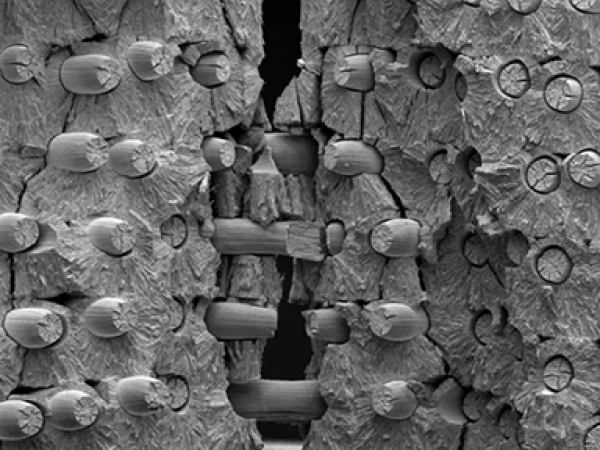
A specimen of tungsten-fibre-reinforced tungsten after a breaking test, viewed through an electron microscope.
Photo: IPP, Martin Balden
Johann Riesch
Max-Planck-Institute for Plasma Physic
Friday, March 31, 2023
10:00am
Abstract: The Max-Planck-Institute for Plasma Physics is one of the largest fusion research centres in Europe and works on determining the physical principles for designing a fusion power plant. An important topic is the interaction of the fusion plasma with the wall materials and components. In this presentation I will give an overview on the Plasma Wall Interaction project with its two large facilities a 3MV tandem accelerator and the GLADIS high heat flux test device. I will present highlights of the various aspects of our research including hydrogen retention, plasma erosion and high heat flux testing. Here, the focus will be in the use of GLADIS for the development of materials and components for present day and future fusion devices. In the second part of the talk the development of tungsten wire composites will serve as a showcase to illustrate our work. After a quick introduction to the development history I will concentrate on the current work and upcoming challenges until its final use as a plasma facing material. Highlights will include qualification in high heat flux testing and the “irradiation program” which includes neutron irradiation experiments and in situ mechanical testing at our accelerator using an in-situ mechanical testing device has been developed. In combination with basic studies on the mechanical behaviour, we use this device to investigate the synergistic effects of irradiation damage, hydrogen retention and mechanical loading. https://www.ipp.mpg.de/3768426/WfW
Bio: Johann Riesch is working as a materials scientist at the Max Planck Insitute for Plasma Physics (IPP) in Garching. He is part of the Plasma Wall Interaction project and dealing with the development and characterisation of materials and components for today and future nuclear fusion devices. Have been working on the development of tungsten fibre-reinforced composites (Wf/W) for many years he is now responsible for the device GIRAFFE which allows mechanical testing with in-situ irradiation and for the high heat flux test device GLADIS.
Johann's research work is based on his mechanical engineering studies at the Technical University of Munich with the special combination of materials engineering and aerospace engineering. The holistic view in materials engineering and the systematic approach in aerospace engineering characterize his way of working. During his Phd and PostDoc time at IPP he was able to develop and establish the new material Wf/W in the fusion community and beyond. This was made possible by combining basic research with a clear objective and the creation and continuous development of a national and international network of partners.
Johann is married and father of 4 children and likes being outside in his free time for sports or hiking. His passion is agriculture and forestry in the family business. Johann is member of the EUROfusion working groups Materials and Plasma Wall Interaction and of the topical groups Metallic Matrix Materials and Ceramic Matrix Materials of the Deutsche Gesellschaft für Materialkunde.